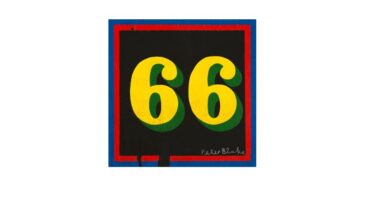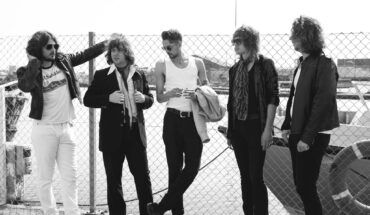It’s as a highly respected musician, vocalist and DJ that Simone Marie Butler cuts a unique figure in the world of music, segwaying from big venue concerts to small DJing gigs with an admirable insouciance.
Having been on bass playing duty with Primal Scream for the past five years “it’s still exciting to be asked to do the things I love”, she says. “I mean, last year I also worked with Ed Harcourt, Faris Badwan and Rachel Zeffira for Cat’s Eyes, so it’s always a buzz to collaborate. But when I first got the gig with Primal Scream, it was Bobby [Gillespie] who rang me up and said they were looking for a bass player.” And she said yes. For Simone, music is all of a piece.
“I also DJ and present for Soho Radio, which I’ve been doing for three years since the station’s beginning. With my show I try to go against the mainstream by playing my favourite music. Sometimes that’s old MC5 bootlegs, sometimes it’s seven-minute long remixes, or an underground unsigned act, all amongst new releases and old favourites. I’ll put every show together myself and invite guests on for an interview. That’s what Soho Radio allows me to do, to really personalise it. One of the other advantages of DJing for the station is that you can make it a reflection of you as a musician. There isn’t the sanitisation that you find on mainstream radio.”
And it’s away from the mainstream where the more interesting artistic projects can be found. Simone agrees. “I strive to push myself in different areas and work in different ways. It really is like what Bowie said, in that you have to work with people who are better than you, and that if you feel slightly uncomfortable doing it, then you’re in the right place. But I’m the only person who should be judging myself, though I’d like to be known for good work. I want to be good at what I do and never stop improving and learning, because in music you don’t. There is always something new to discover.”
Simone’s presence in one of the world’s biggest bands calls to mind the funkier, gender-diverse musical movements of Sly and the Family Stone or the New Rotary Connection, both large outfits that were never constrained by notions of what a band should look or sound like, and who were able to make a freshened, indelible music that has lasted down the years. “A lot of people ask me what it’s like being a woman bass player, to which I answer, what’s it like being a male dentist or a male fashion designer?” she laughs over coffee on a finger-numbingly cold Brixton afternoon. “To be honest, I don’t think about it, and I really couldn’t care less, but I am aware that in the music industry it does stand out more.”
But has she ever experienced discrimination because of her gender? “I’ve never experienced any misogyny directly because of what I do, and I wouldn’t see it anyway because I’m working all the time. Musicians and creatives aren’t thinking in that mindset. That’s not to say it doesn’t exist, and much more heavily in some parts of the industry than others. If anything, it probably exists on the business and corporate side to a greater degree. The people I surround myself with just aren’t like that. It’s like what Carol Kaye said: ‘a note doesn’t have a sex’. Maybe if I were on the pop side of things, or if I was a solo artist then perhaps I’d see more of it, but I’ve never worried about being a woman in the music business. I’ve worked at record labels and seen more sexism there and actually experienced far more misogyny when I ran a music shop. It never occurred to me that I couldn’t do something because I was female and it shouldn’t for any young girls out there. I’ve never worried about not being accepted because I don’t sell myself on the hinges of being female. If I thought like that then I wouldn’t be doing what I’m doing.”
“I’ve always learned the most when I’ve been slightly scared of doing something. A lot of people have a fear of saying yes, but for me the fear is of saying no.” In other words, never limit yourself when creating? “Yes, I always wanted to make music. My dad was a musician, he was a guitarist so there was always music being played in the house, there were always instruments around and musicians were coming and going when I was young. It wasn’t exotic to me. Music was something that you could make a living from. I grew up listening to my dad’s records, be it The Beatles, Eddie Cochran, Little Richard or Roy Orbison. So, lots of rock’n’roll! I never envisaged doing anything else really, and whenever I had had regular jobs, I’d felt unhappy. I’d felt unconnected to what I love. I always did music and bands on the side, but yes, of course in this day and age, it can be difficult to make a living when so many consume music by streaming it for free. People often make this mistake of thinking that you have to be famous to make a living out of music, but it’s just not true. You can be a working musician and have a really great life. You can also be in the public eye and be totally skint so it works both ways.” Which is to say it’s about staying true to thine own self; or better still, staying loyal to your muse.
When it comes to bass players, Simone says she admires the work of Motown legend James Jamerson, Charlie Mingus, Paul Simonon, Jah Wobble, Steven Severin, Simon Gallup, Gail Ann Dorsey, and people like Warren Ellis, Anton Newcombe and Jehnny Beth of Savages. “One of the things about being a musician is that you start being a lot more open minded about what you don’t like, or didn’t like before and you’re less critical, so that you find yourself in a position of always finding the good in something. You may not be into a certain genre or band but you can appreciate how good or well crafted an album is. And that should make sense to anyone, no matter what they’re doing, be it photography or whatever you’re into. You’re either going to be the person who embraces openmindedness with your work or the one who shies away from it.”
Does she plan ahead? “I never plan too far ahead. I’m sure I should do, but I’m not a five-year plan kind of person,” she laughs. “Or at least if I planned that far ahead five years would be my cut-off point. Probably because I’ve been derailed at so many points in my life for one reason or another …but that’s another interview. I want to carry on with what I do. Music saved my life for sure. I’ll never stop playing bass. Also I’d like to acquire more studio-based, production skills like learning how to remix. I’d like to do my own music project at some point too. There’s also photography to stay involved with and learning how to make music videos, which I’ve wanted to do for years. I’m inspired by the work of Douglas Hart, he’s a real talent. And I’m into the visual representation of music. But I’m very happy with where I am right now. I’m also happy to stretch myself and I believe that it is only up to you to stretch yourself. The will has to be your own. So it’s up to me to be inspired.”
“But a big pitfall in music is losing your focus, or letting things go to your head. You should never play the fame game, because it’s not real. People today can place too much importance on how many followers they have on YouTube or Instagram which only leads to a celebration of mediocrity. Social media has screwed people’s minds in some ways. It can bring out the worst in people and leave people disengaged from real-time relationships and the world around us. It places too much importance on people’s online presence, something that can be manipulated to present an over-exaggerated version of the truth and that’s not healthy. A mistake is to get caught up in it all and to think that it’s more important than reality. Music and fame are two different things. I always keep level-headed people around me, and since I found my creative outlet later on in life, you could say, I feel I’m more able to appreciate the opportunities I’ve been handed.”
And with her involvement alongside Mystery Jets and Band Of Skulls in the Cavalry benefit gig on 17 February for her friend Greg Gilbert of the Delays who is currently being treated for stage four bowel cancer, Simone is now also a force for good. “We just want to save his life because he isn’t getting the treatment he needs on the NHS,” she says, her eyes clouding with a sudden sadness. “He is an incredibly beautiful soul and one of the most talented people I’ve ever met. There is also a campaign right now to get the Delays’ single ‘Valentine’ to No.1 for Valentine’s Day. The power of collective spirit can really change people’s lives. It’s easy to forget that we should truly appreciate all the great people in our lives while they’re here. And we shouldn’t sweat the small stuff.”
Jason Holmes
@JasonAHolmes
Photo Credit:
George Stavrou
@GStavrouFoto





